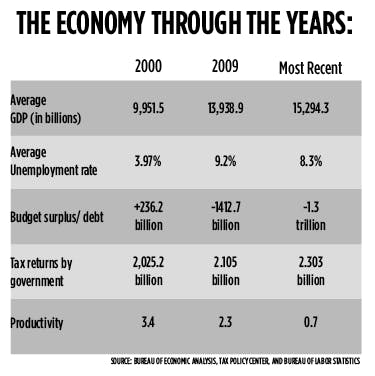For a journalism project last week, I was interviewing various people about the economy’s effect on local businesses. The people I spoke with discussed businesses shutting down left and right and how some fields have been hurt more than others. Toward the end of one particular interview, I asked the person if he thinks the U.S. economy is headed in the right direction. His response: “No.”
To be honest, his answer surprised me a little. I expected him to ramble on about how things can’t possibly get any worse, so they have to get better. I expected him to be more excited about the 243,000 U.S. jobs created last month. We continued to talk about the changes he’s seen since he has worked in the Lansing area for more than 15 years and how things have headed downhill since the recession began.
After my interview with him, my mind kept going back to his lack of confidence in the economy’s growth. I couldn’t help relating it to a statistic I read from the Pew Research Center earlier in the month about demographics and optimism in regard to the economy. The survey stated young adults between the ages of 18 and 34 say the current economy has impacted decisions regarding career, marriage, school and parenting, and a plurality of Americans say that specific age group was hit the hardest.
But young adults also remain optimistic. Almost nine out of 10 young adults believe they earn enough money to lead the life they want to live, or expect to earn enough in the future, according to the same survey.
Is the economy really improving, or are we just wishful thinkers?
Don’t get me wrong, almost all signs point to the economy being better than two or three years ago. Although the U.S. is improving, we still aren’t in a good state. Things aren’t as bad as they were in the 2009-10 economy, which was a borderline depression, but we most definitely are not where we should be to call our economy satisfactory.
In January 2012, the U.S. unemployment rate was 8.3 percent, which has given our generation of college students and recent graduates something to grasp onto. Finally, after too many years spent hovering around 9 percent, we are given a cold, hard number that offers the smallest glimmer of light at the end of this seemingly endless tunnel.
But for the hopefuls who want to remain in their home state of Michigan after graduation, the unemployment within our state’s borders is discouraging. The most recent rate pertains to December 2011, at 9.3 percent — one full percentage point above the national average. When things are bad for the country, things seem to always be worse for Michigan. We reached a 14.1 percent unemployment rate in July and August 2009 — a number we haven’t touched since August 1983.
People keep talking about how the U.S. slowly is headed out of this economic slump its citizens lived in, but realistically, this could be it.
Thankfully, things didn’t remain the way they were a few years ago. The U.S. had turned into a country where its citizens’ hearts stopped every time the phone rang, fearing the layoff that would make them another statistic. Middle-class citizens living comfortably suddenly were forced to pinch pennies to make ends meet. People thought it only would be a matter of time until we all fought our way out of that nightmare. But now? Not so much.
There’s a likely chance we might never get back to where we were 12 years ago, back to when things were comfortable. In January 2000, the U.S. unemployment rate was at an acceptable 4 percent, and the federal budget was running a yearly surplus.
Things were good back then until the rug got pulled out from under our country’s feet, but the U.S. has dealt with some difficulties.
The economy and demand for jobs are shifting. With technological advances, the country will never return to a point where 18-year-olds can walk into a factory with a high school diploma and bring home a middle-class salary to support their families. Computers and machines have taken the place of those workers.
But the country is adjusting to the times — new markets are emerging. People still need to conceptualize, build and upgrade advanced machines. Engineers and information technology workers might be replacing the workers who labored away at auto factories in Detroit 20 years ago. And maybe the nine out of 10 young adults who believe they will be able to live up to their means just acknowledge the changing economy. Now an education from a college or trade school is more necessary for success than it was 20, 12 or maybe even five years ago.
That shift and the confidence of young people might be what will pull the U.S. back to that level of comfort that many young adults have never been able to experience. Maybe our generation can change things.
Alyssa Girardi is the State News opinion writer. Reach her at girardi5@msu.edu.
Support student media!
Please consider donating to The State News and help fund the future of journalism.
Discussion
Share and discuss “Youth will drive the new American economy ” on social media.







